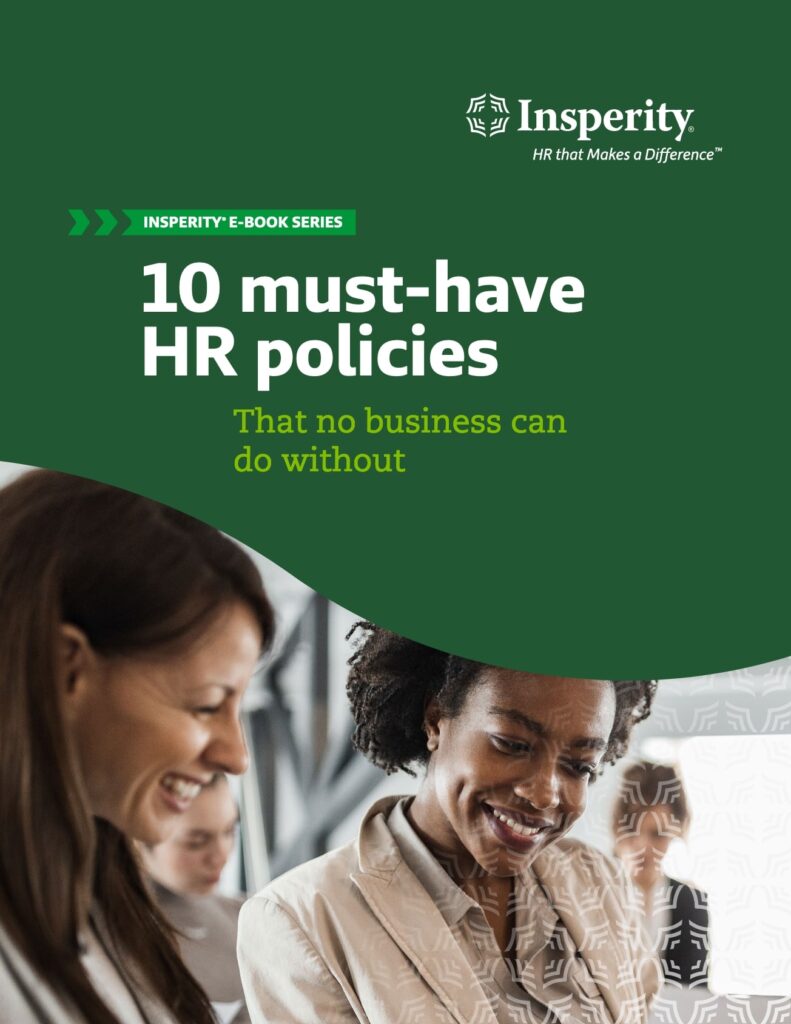Forward-thinking business leaders understand the importance of clearly defined HR policies. Even if you have an instinctive understanding of how to handle challenging situations in the workplace, and trust your people to make good decisions, written policies and procedures are fundamental to your company’s success. They protect your business and educate new employees about different scenarios they may encounter at work.
But where do you start? What human resource management policies do you need in your business?
To get you started, below are 4 important HR policies your business cannot afford to ignore.
- Policy #1: Equal Employment Opportunity
- Policy #2: Workplace disability and leaves of absence
- Policy #3: Employee time off
- Policy #4: Progressive discipline and termination
We’re also giving you access to 6 additional policies you’ll want to include in your employee handbook – and more details on how to implement each of these policies while remaining compliant. Grab a copy of our deep dive into 10 HR policies every business must have now.
Policy #1: Equal Employment Opportunity
The Equal Employment Opportunity Commission (EEOC) is the government agency responsible for enforcing federal laws relating to employment discrimination. The laws associated with these are often abbreviated as “EEO.”
Structured EEO policies are necessary
Every business needs a structured EEO and anti-harassment policy. This sets the standard that everyone is provided equal employment opportunities and illustrates to employees, the EEOC, and state and local entities that your company takes equal opportunity seriously.
Benefits of EEO policies
EEO policies ensure everyone is on the same page with what is and what is not acceptable under the law. Often, people make jokes, send inappropriate emails or behave in ways they don’t realize constitute discrimination or harassment under federal law. A solid and clear policy ensures there are no misunderstandings.
Prevents legal problems
A written EEO policy helps protect your company in the event it’s accused of workplace discrimination or harassment. If no policy is in place and a complaint is made to the EEOC, your company will have a tough time defending itself and, in the end, can be held in violation and liable.
Discrimination and harassment are often subtle or even unintentional. Good company policies are designed to simultaneously educate everyone and also prevent unconscious bias during hiring, promoting or other employee-related activities.
We dive deeper into properly implementing compliant EEO policies in our e-book here.
Policy #2: Workplace disability and leave of absence
The Americans with Disabilities Act of 1990 (ADA) protects employees from discrimination based on a physical or mental disability as outlined under applicable laws.
Importance of an accommodation policy
A workplace disability designation under the ADA is designed to inform your employees of their legal rights and how your business will respond to any situations or accommodation requests.
Risks of not establishing ADA policies
Under federal law, employers are required to grant reasonable accommodation requests to qualified individuals with a disability.
If these are ignored due to perceptions a disability doesn’t exist, this could result in an investigation or lawsuit in the event violations are found.
A clear ADA policy ensures everyone in the organization understands what is or isn’t acceptable under employment laws and outlines the business’s process for handling situations.
Leaves of absence
Leaves of absence are linked to specific accommodations that may be requested to allow employees reduced schedules or time off to seek recovery or treatment.
This can include:
- Medical conditions
- Injuries
- Qualified disabilities
The Family and Medical Leave Act (FMLA) falls under this umbrella and is a law designed to require employers to provide eligible employees up to 12 weeks of job-protected, unpaid leave.
It’s important for everyone in an organization to understand that not all disabilities are visible or requests for leave transparent. A good leave policy will educate internal stakeholders of their rights and also help those in decision-making roles address eligibility regarding workplace leave-related issues.
Don’t leave your workplace policies compliance to chance. Get a free copy of our 10 must-have policies e-book to learn more about how to properly build and implement a workplace disability and leave of absence policy.
Policy #3: Employee time off policy
Specific policies relating to time off are a valuable employee benefit. For employers, it can help attract top talent, along with helping to ensure you’re in compliance with any state or local employment laws.
Everyone at some point needs time off for vacations, holidays, recoveries from minor illnesses or mental breaks from work. To offer this perk to employees, who won’t feel guilty or worried over repercussions for wanting time off, is a huge appeal for a potential applicant.
An official policy also demonstrates your company’s commitment to providing equal treatment and ensuring the well-being of your employees.
Policy #4: Progressive discipline and termination
Every company needs a progressive discipline and termination policy regarding employee conduct. No employee should ever be caught off-guard by punitive action taken against them.
This policy should:
- Be explicit to let employees know how disciplinary action would occur under specific conditions
- Serve as a cost-saving measure because when employees are clear on expectations, policies are less likely to be broken.
This means lower employee turnover and fewer budget dollars sunk into the recruiting, hiring, onboarding and training processes. It gives you the opportunity to evaluate employees based on a set of standards, giving them the tools needed to improve. You also protect yourself from wrongful termination lawsuits.
Key takeaways
You’ve learned about some of the important policies all business owners and HR professionals must consider when creating a comprehensive human resources plan. However, each business is different and policies should reflect those differences. Federal, state and local laws also play an important role in the HR policies you implement.
To learn more about essential HR policies and gain specific step-by-step guidance on how to implement each of the 10 HR policies, be sure to access our e-book today.


